GPM vs PSI: Which is More Important in a Pressure Washer?
-
Pete Ortiz
- Last updated:
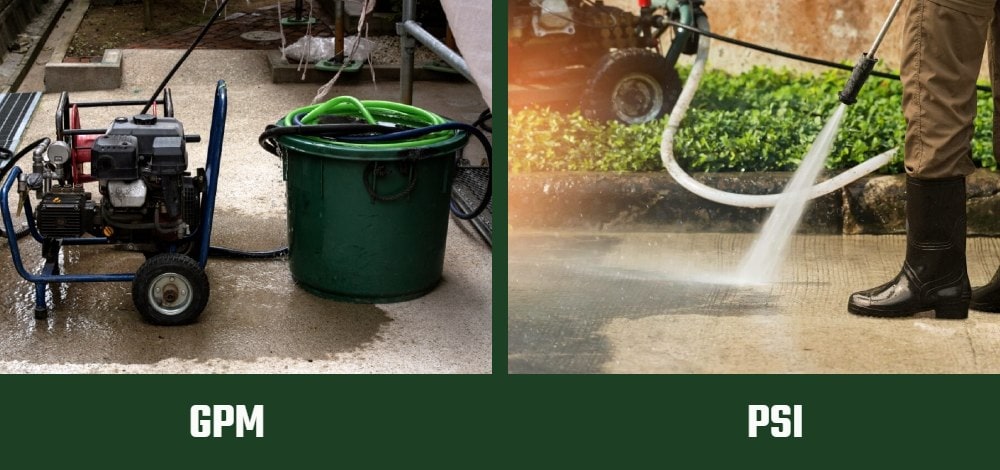
Pressure washing is a great way to bring a surface back to life and provide a thorough deep cleaning. Whether it’s your deck, patio, driveway, or siding, pressure washing is an excellent cleaning method.
Knowing how much power you need is key if you are looking to buy or rent a pressure washer. To correctly measure the cleaning power of a pressure washer, it is essential to understand what GPM and PSI mean, but which one is more important?
Here’s what you should know about PSI and GPM and what they mean for a pressure washer’s cleaning power.
Overview of GPM on a Pressure Washer
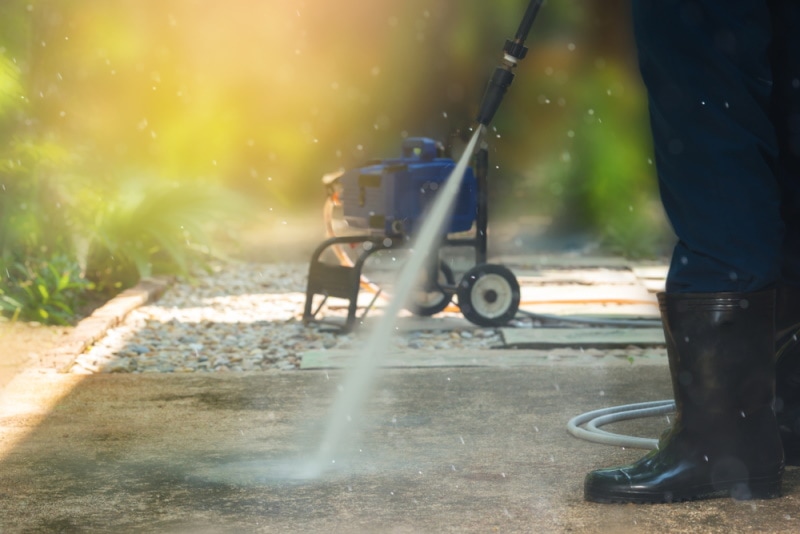
GPM stands for Gallons per Minute and is the standard against which pressure washers are measured. Simply put, GPM is the rate of water flow produced by water pressure. The pump of a pressure washer generates water pressure by forcing water through a small hole.
The GPM on a pressure washer can range depending on what kind of pressure washer it is. Residential pressure washers will have a lower GPM, while commercial pressure washers will have a higher GPM.
Why Is GPM Important?
When comparing pressure washers, one of the main specs that distinguish the machines is the GPM. GPM is important because it determines how much pressure is applied to the surface being pressure washed. Pressure washing uses a high volume of water, so it’s essential to know and understand how much water your machine is using, and the GPM will help you determine this.
A washer with a higher GPM will clean faster than one with a lower GPM. Pressure washers with a higher GPM require more maintenance than pressure washers with a lower GPM, and you’ll need to clean the filter more regularly and grease the pump more often.
Understanding GPM is important because if the pressure of the water flow is not handled correctly, it can cause some damage to the surface you are cleaning.
What Is a Good GPM for a pressure washer?
The right GPM for a pressure washer is determined by the size and complexity of the surface you are cleaning. If you’re cleaning a wide area or removing stubborn stains and grime, you’ll need a washer with a high GPM, while a washer with an average GPM volume is sufficient for minor cleaning jobs or easy projects. The best commercial pressure washers can range from 3–6 GPM, while most residential pressure washers have a GPM rating of 1–2. Here are some examples of pressure washer GPM requirements based on specific situations.
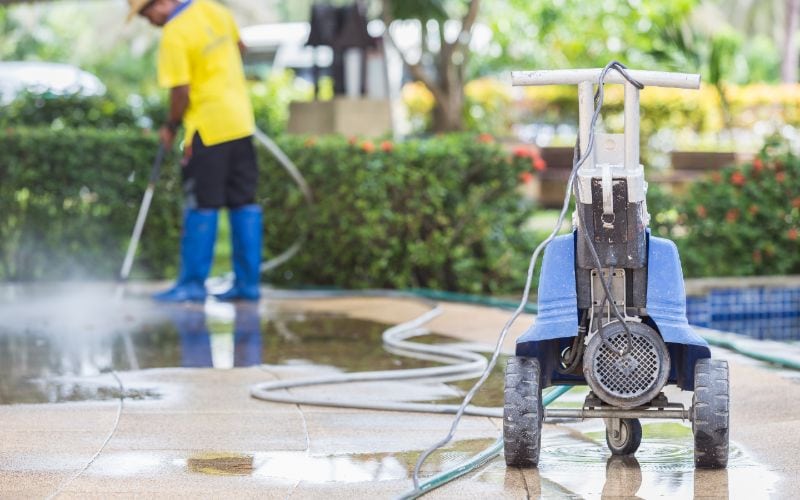
- Cleaning small areas of your home, such as the porch or deck: 2 GPM
- Very light cleaning, such as your motor vehicle: 1.5 GPM
- Cleaning your driveway and other more stubborn areas: 2–2.5 GPM
- Commercial cleaning of wood or concrete: 2.5 GPM
- Paint stripping or large commercial cleaning jobs: 3–7 GPM
Is High-Pressure GSM safe
Pressure washers are extremely powerful and can release quite a jolt of power when used. Higher GPM pressure washers may also be more difficult to control. If you have never used a pressure washer before and are unprepared for its power, it can cause injuries. Furthermore, it can cause harm in other ways that are important to understand to stay safe.
If the electricity and water come into contact, the intense shocks could be life-threatening. It is important to keep away from electrical sources when operating a pressure washer, especially with a high GPM.
Overview of PSI on a Pressure Washer:
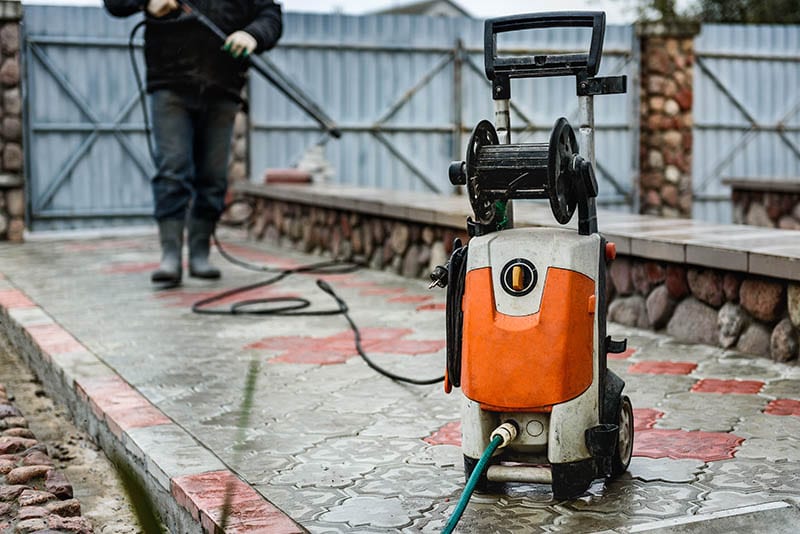
PSI stands for pounds per square inch and is how the pressure of a pressure washer is measured. It is a measure of the force of water and is the number that most people are familiar with on a pressure washer.
Why is PSI Important?
PSI is a vital concept to recognize for a variety of industries and applications. This unit provides valuable information about the pressure difference between a pipe or pressurized tank and the surrounding atmosphere. The higher the PSI, the more power the water has, so in many cases, bigger is better.
Homeowners looking to maintain the outside of their home with a pressure washing every once in a while, won’t require a pressure washer with a high PSI. In contrast, commercial cleaning companies that handle large-scale jobs on a daily basis will need to invest in pressure washers with high PSI.
What Is a Good PSI for a Pressure Washer?
Large jobs with a large volume of grime can be resolved more efficiently with a high PSI washer. Here are some examples of pressure washer PSI requirements based on specific situations.
- Cleaning your motor vehicle or truck: 1,200–1,900 PSI
- Patio furniture: 1,500–1,900 PSI
- Driveways and patios: 2,900–3,200 PSI
- Heavy-duty cleaning: 3,300+ PSI
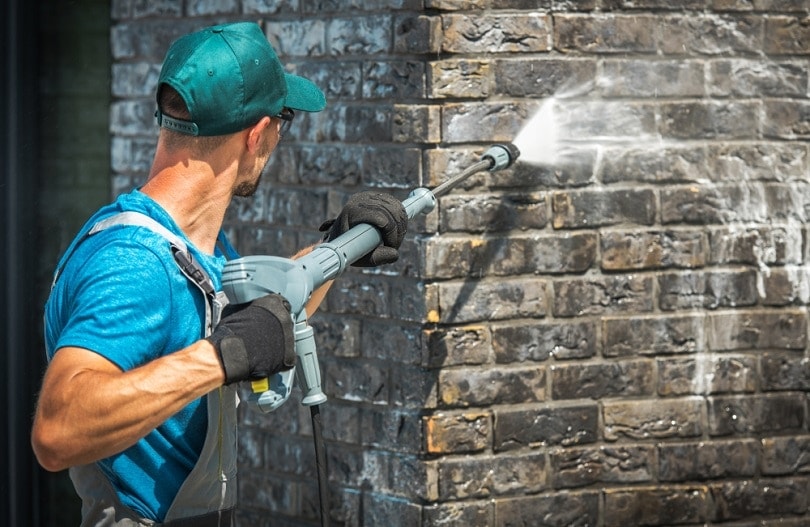
Is high PSI safe?
PSI is important not only for cleaning power and selecting the right machine for the job but also for health and safety.
The force of the jet streams of a pressure washer may cause significant injury to human skin and other organs, particularly the eyes, and it is imperative to be aware of its power and operate the pressure washer while wearing protective gear.
If you apply too much pressure and water at once, your target area may be damaged. Use both hands while operating the machine and stand with both feet firmly on the ground. Start by standing further back from your cleaning target, and once you have gotten comfortable with the pressure and distance, you can gradually move forward.
 Which Is More Important? GPM or PSI?
Which Is More Important? GPM or PSI?
Cleaning Units is the combination of PSI and GPM and is a gauge of how efficiently a pressure washer works. Cleaning units of a pressure washer are calculated by multiplying the PSI by the GPM.
For example, if a pressure washer had a PSI of 2,000 and a GPM of 3, compared to a washer with a PSI of 3,000 and a GPM of 2, both with an overall cleaning unit count of 6,000, the washer with the higher GPM would finish the job faster, despite having the same number of cleaning units.
PSI can be easily manipulated by changing nozzle sizes, and pressure washer manufacturers can cheaply boost their PSI rating.
If you want to work more efficiently, pay attention to the GPM rating when purchasing a pressure washer. A manufacturer cannot manipulate this rating. If the GPM rating is less than 1.0 GPM, depending on your usage, you are most likely using an inefficient pressure washer. A higher GPM over a higher PSI is usually preferred by a professional power washing contractor because a professional will generally use cleaning solutions to loosen stains and dirt rather than relying solely on PSI.
Below is a table to help you understand the PSI, GPM, and cleaning units for certain machines and applications.
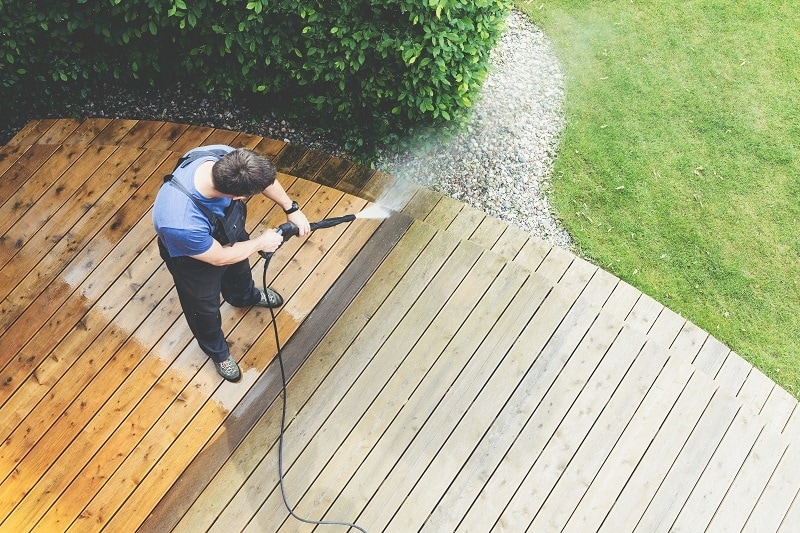
| Type of pressure washer | PSI | GPM | Cleaning Units | Application |
| Light duty for small jobs | 1,400–1,700 | 1.4–1.6 | 1,900–2,800 | Small cleaning projects and cars |
| Light duty for bigger jobs | 1,800–2,200 | 2.0 | 3,600–4,400 | Residential jobs like siding at decks |
| Medium duty | 2,300–2,500 | 2.2–2.3 | 5,000–7,000 | Residential cleaning jobs including driveways |
| Commercial | 2,600–3,100 | 2.5 | 6,500–7,750 | Cleaning concrete |
| Heavy duty commercial | 3,200–4,000 | 3.0–4.0 | 9,600–14,000 | Large cleaning jobs, stripping paint |
Other Factors to Consider
Pressure washers are available in gas and electric-powered units, and both have their pros and cons. Gas pressure washers are more powerful, they require more maintenance, and are much noisier. Electrical pressure washer washers are easier to maintain and don’t make as much noise, but they are not as powerful.
Hot water pressure washers can remove the toughest dirt and have a higher GPM than cold water machines, but they are more expensive. If you pressure wash often, a hot water machine will be worth the extra cost. If you only pressure wash occasionally, a cold water washer will be cheaper and still get the job done.
Conclusion
Good pressure washers require a balance of GPM and PSI, and they work hand in hand to get the job done. Generally, as the PSI goes up, so does the GPM. The GPM and PSI that are needed on a machine will depend on the size of the job. It’s important to use the correct GPM and PSI for the surface that you are cleaning to avoid damage.
Featured Image Credit: (L) Nikox2, Shutterstock | (R) sbw18, Shutterstock
Contents



 Which Is More Important? GPM or PSI?
Which Is More Important? GPM or PSI?